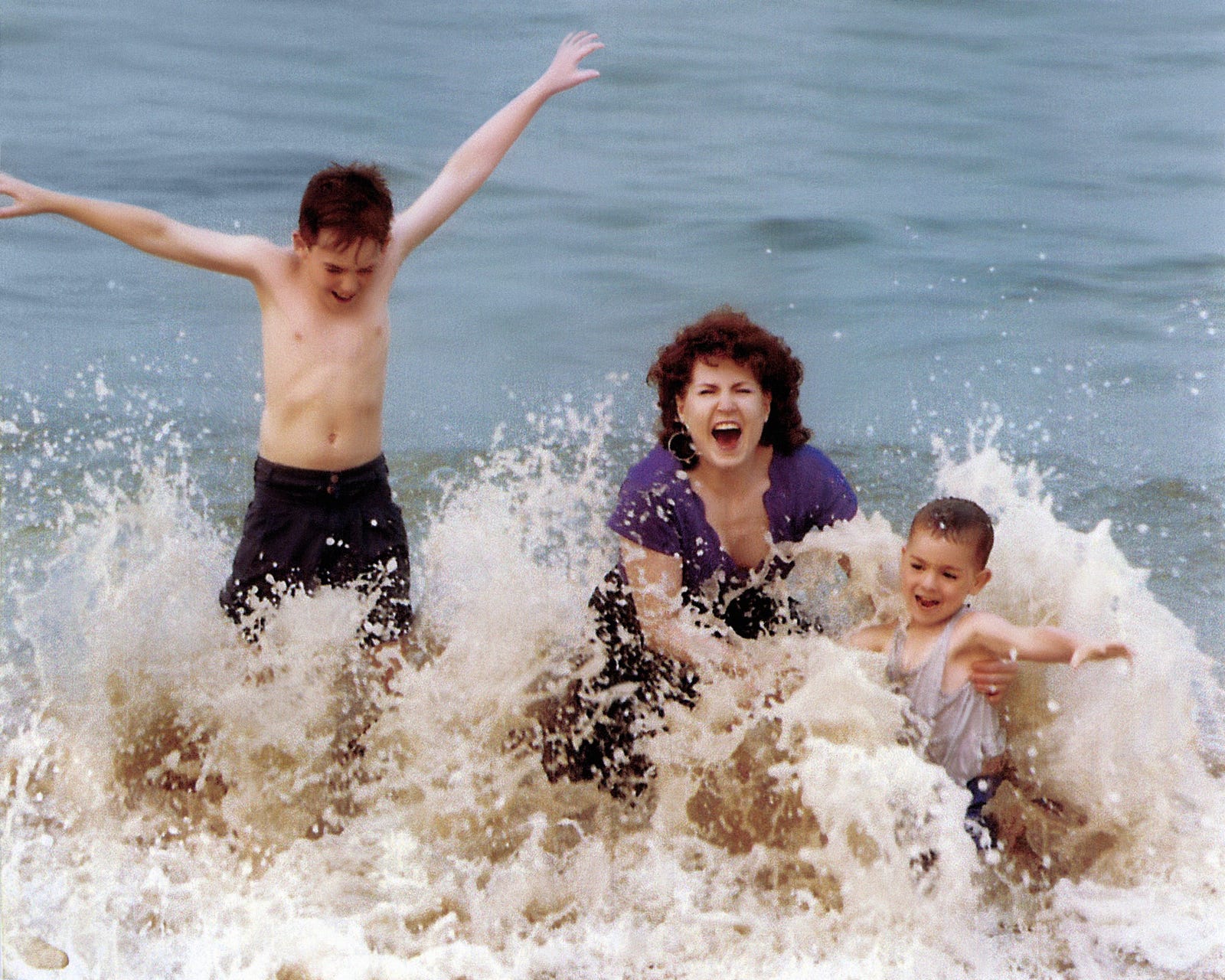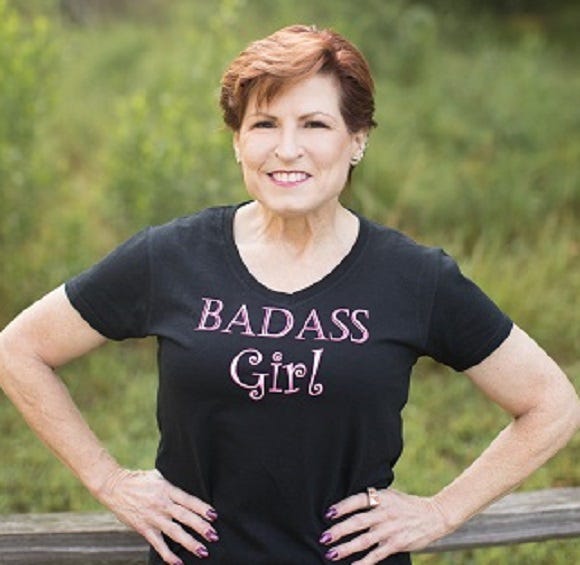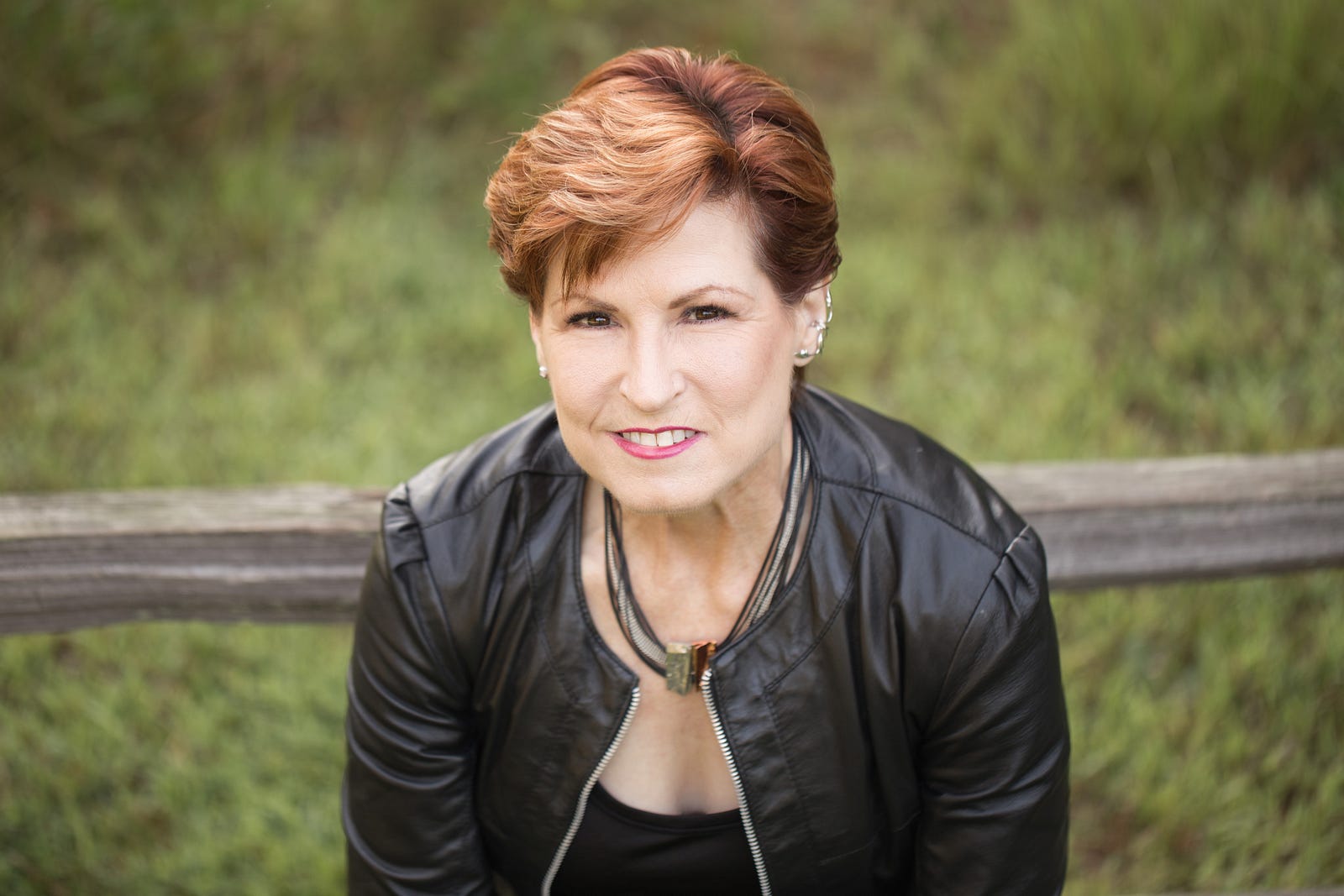For heaven’s sake, send thank you notes to people who help you along the way! Don’t forget people who interview you; they almost never get thanked and your hand-written note will be remembered and may lead them to interview you again at a later date. (Also, don’t forget the people whose heads you bit off while you were writing!)
As part of my interview series on the five things you need to know to become a great author, I had the pleasure of interviewing CJ Scarlet.
CJ is an entrepreneur, motivational speaker, and author of The Badass Girl’s Guide: Uncommon Strategies to Outwit Predators. An expert in victim advocacy, CJ has given speeches and workshops at national and international events; and has appeared on numerous radio and television programs, including MSNBC and NPR. The former roller-skating carhop and U.S. Marine photojournalist has been named one of the “Happy 100” people on the planet. Her personal story of triumph over adversity is featured in several books, including bestsellers Happy for No Reason and Be Invincible.
Thank you so much for joining us! Can you share a story about what brought you to this particular career path?
As a survivor of sexual assault as a college freshman and while serving in the Marine Corps, I know first-hand how violence can destroy lives. I spent years dealing with the emotional aftermath of my experiences. After taking my power back, I became an advocate for others who had been victimized, running a child advocacy center and serving as Director of Victims Issues for the North Carolina Attorney General’s Office. My desire to keep others from harm lead me to write The Badass Girl’s Guide, which teachers readers how to out-think, out-talk, and out-fight criminal predators.
Can you share the most interesting story that occurred to you in the course of your career?
This story has less to do with my career and more with my personal life. After years of living with depression and anxiety from the assaults I endured, I developed two life-threatening autoimmune conditions which, in 2002, left me fighting for my life. By 2004, I was told my condition was terminal. I became so debilitated I had to crawl on my hands and knees to get upstairs, and I couldn’t lift a cup of coffee or hold a hairbrush. I became very deeply depressed and anxious about my impending heart failure.
Then I was offered the opportunity to meet privately with a Tibetan Buddhist lama who kindly but sternly commanded me to “stop feeling sorry for myself and start thinking of the happiness of other people.”
Daunted but determined, I began performing small acts of kindness — letting the mom with the crying baby go ahead of me in line, giving my cane to a woman who was struggling to walk, and volunteering at the Red Cross after Hurricane Katrina. These simple, spontaneous acts made me feel a happier, so I did more, and the more I did the better I felt, until I reached a point where my heart was so full it no longer mattered whether I was sick or well, or even living or dying — I was filled with gratitude for each moment.
At that point, my condition went into remission! Today, I feel better and happier than I ever dreamed possible, and I’m thriving both personally and professionally.
Can you share a story about the funniest mistake you made when you were first starting? Can you tell us what lesson you learned from that?
I remember one time early in my Marine Corps career when the Inspector General (IG) came to our base at Camp Pendleton, CA, to inspect the troops. The entire division was gathered for the inspection and I was at the front of my platoon, standing between two six-foot something Marines, with little ole me, barely topping 5’, between them.
The IG came down the line, followed by a gaggle of generals and colonels, stopping occasionally to grill someone about military subjects. I was so afraid he was going to grill me too and I held my breath as he, fortunately, went right on by. I breathed a huge sigh of relief.
But then he slowly turned back around and stopped right…in…front…of…ME! He looked up at the two six-foot-something Marines on either side of me and then peered down intently at me. He slowly looked me up and down, leaned in and barked “Are you sure you’re tall enough to be a Marine?”
Without skipping a beat, I snapped to attention and smartly said, “SIR! I am 5–2”, 120 pounds of twisted steel and sex appeal!” (which my drill instructor had taught me for laughs)
As the words flew out of my mouth I saw the horrified look on the faces of the gaggle of generals and colonels and I knew then that I was a dead woman walking. And then… the general started laughing! And the harder he laughed, the more the gaggle laughed with him and I lived to fight another day.
The lesson I learned was two-fold: #1) Don’t smart off to your superiors, and #2) If you screw up, at least make them laugh!

What are some of the most interesting or exciting projects you are working on now?
I’m involved in a number of exciting projects, including promoting my book and working on a follow-up book entitled Raising Badass Kids: Talking to Your Children from 2 to 22 about Danger, starting a nonprofit to teach women and girls in imperiled communities around the globe to defend themselves from violence, and working with the founder of Take Our Daughters to Work Day to create workshops for girls to keep them from falling off the adolescent “cliff” that causes them to lose their self-esteem and confidence.
I also serve on several corporate and nonprofit boards, and volunteer in my local community. Most importantly (to me), is the time I spend helping raise my three grandchildren to be confident and compassionate human beings.
What is the one habit you believe contributed the most to you becoming a great writer?
I don’t have a lot of structure or habits around my writing. As a trained photojournalist, I’m able to write any time (although I prefer the quiet hours in the middle of the night) as much or as little as I like. If I had to point to one thing that helped me as a writer, it would be humility. It always amazes and even frightens me a little that the words I write during any given sitting are different than what I would have written if I’d chosen a different time to work on my book.
Can you share the most interesting story that you shared in your book?
I like this passage because it succinctly explains how women and girls can become a force to be reckoned with:
Think you can’t protect yourself because you aren’t a martial artist? Haven’t taken formal self-defense classes? Because you’re too old? Physically unfit? Too timid?
Imagine for a moment you decide (and I don’t recommend this) to take down that wily squirrel who’s been raiding your bird feeder. You sneak up on tiptoe and BOOYAH! You’ve got the culprit in your hands!
No, what you’ve got is a whole mess of trouble! Think that squirrel is meekly going to give you control? Hell no! Ms. Squirrel is going to squirm and claw and bite and scratch and fight to get out of your grasp as if her life depended on it. She doesn’t care how big you are or how small she is; she’s determined to prevail. Even the most skilled black belt would be no match for this one-pound rodent.
That’s actually a pretty funny image — Jackie Chan getting his butt kicked by a common brown squirrel — but I want you to take it very seriously because that image might save your life one day.
Better yet, let’s use the imagery of the Australian Tasmanian Devil. Although just the size of a small dog, it has the strongest bite of any land mammal and is so ferocious it can repel almost any predator that comes its way. If you recall the old Looney Tunes cartoons, “Taz” is a whirlwind of fists and feet, fangs and raw power. In addition, the real Tasmanian Devil uses a pungent body odor and nerve-racking screech to ward off its enemies.
Think it’s not in you to fight? Let me ask you this: What would you do if your child or dearest friend were being attacked? Fight like a rabid Tasmanian Devil, I’m betting. You have it in you, I promise, to fight like Taz, and if you do, you increase your chances of getting away from a perpetrator by up to 84 percent!
Never forget, you always have powerful weapons at your disposal — all contained within the body you walk around in — should you need them in the event of an attack. I’m giving you permission to fight as dirty and unfairly as you can. Go for the predator’s weakest spots: the groin, nose, and throat, and anywhere else on his body you can grab or twist to convince him to drop you like a hot rock and run.
What is the main empowering lesson you want your readers to take away after finishing your book?
I want my readers to feel confident and powerful, knowing they DO have it in them to thwart predators, either by avoiding attempts to groom them for victimization or by physically defending themselves. Confidence is the best predator repellant!

What was the biggest challenge you faced in your journey to becoming a bestselling author? How did you overcome it?
My greatest challenge was feeling overwhelmed by the plethora of options for promoting the book. Choosing whether and when to focus on media interviews, social media postings, book signings, etc. was daunting. Having so many possibilities is paralyzing and caused my marketing efforts to stall. Fortunately, I was selected for a year-long program, Women Who Lead, designed to help me achieve my goal of getting my books into the hands of as many and girls as possible. Through this program, I was assigned two global advisors who motivate me and keep me on track.
Which literature do you draw inspiration from?
I’m a nonfiction/self-help author, so I’m going to list my favorite works in that genre. Books that have had a huge impact on me include The Big Leapby Gay Hendricks, Meet the Frugalwoodsby Elizabeth Willard, Badass Your Brandby Pia Silva, Daring Greatlyby Brene Brown, and Better Angels of Our Natureby Steven Pinker. My favorite work of fiction is The Orphan Master’s Sonby Adam Johnson.
How do you think your writing makes an impact in the world?
My greatest wish is that my books will actually keep people from being assaulted and save lives by helping them learn to protect and defend themselves.
What advice would you give to someone considering becoming an author like you?
Throw a kick-ass launch party! You deserve to be feted by your friends and fans, and a launch party is a great way to kick start book sales. Hold the event at a cool, hip location and have plenty of finger foods and wine available. Do a short reading. Consider selling complimentary items along with your book. For example, I sold Badass Girl t-shirts, self-defense keychains, and bracelets with empowering sayings on them. There was a buying frenzy and the sales more than paid for the event itself.
What are your “5 things I wish someone told me when I first started”?
1. You ARE an expert!For some time I thought that if I didn’t know everything about my subject, I couldn’t write about it. Be confident that what you have to say is important and will resonate with the people who are ready to hear it, in YOUR voice. To paraphrase my favorite quote (by Henry Van Dyke): “How silent the woods would be if only the best bird sang.”
2. You WILL get disrupted while you’re writing (unless you’re a hermit).My family learned to tiptoe around the house while I was writing my first book (Neptune’s Gift: Discovering Your Inner Ocean). Try to be patient and not bite peoples’ heads off, as I did. I wrote the second book after my children were grown and my husband had passed away, so I had much-needed silence to work in.
3. Don’t feel like you have to have a rigid schedule or write a certain amount every day (unless that’s helpful to you).I work best when I take advantage of what time is available, whether it’s at 2 pm or 2 am. For a long time, I felt like I was doing something wrong by not being more structured, until an author friend assured me that my style or working was perfectly fine.
4. For heaven’s sake, send thank you notes to people who help you along the way! Don’t forget people who interview you; they almost never get thanked and your hand-written note will be remembered and may lead them to interview you again at a later date. (Also, don’t forget the people whose heads you bit off while you were writing!)
5. Be compassionate with yourself. Beating yourself up because you didn’t write your desired word count or made a mistake is pointless and demotivating. Lighten up and put as much “space” around your writing as you can so you can breathe and not feel stressed (which contributes to writer’s block!).

You are a person of great influence. If you could start a movement that would bring the most amount of good to the most amount of people, what would that be?
I would make my book required reading in every high school and college in the world. Seriously. The messages and advice in my book are literally life-saving and could spare millions the pain of post-traumatic stress and trauma. I say this not because I want to make more money but because I want to make an impact.
How can our readers follow you on social media?
I can be found at:
· https://www.facebook.com/cjscarletauthor
· https://www.linkedin.com/in/cjscarlet
· Twitter: @cjscarlet & @badassgirlbook
Thank you so much for this. This was very inspiring!
Thank YOU!


